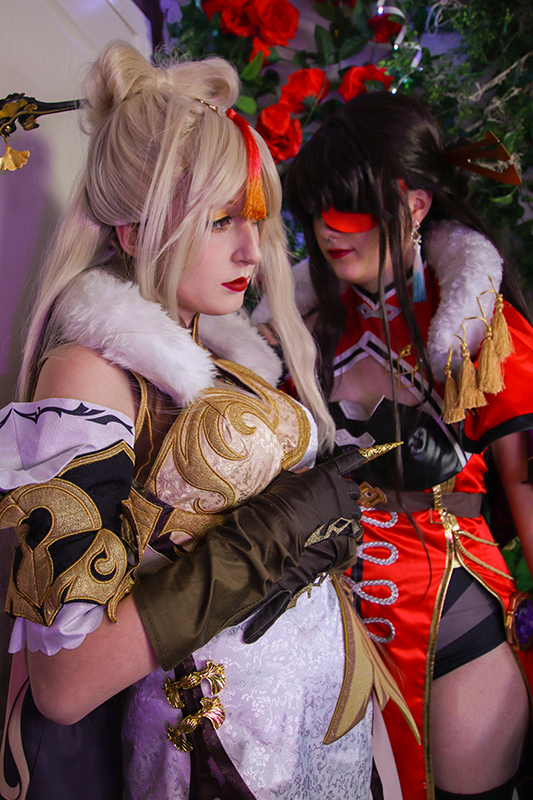Maiya “Zero” Hanson (left) and Makaila “Arzen” Pocock (right), are local cosplayers dressing up as Ningguang and Beidou from Genshin Impact. Photo by Noreve Belarmino.
The term Cosplay or costume and play began in 1984 by Nobuyuki Takahashi, the founder of Studio Hard. After Takahashi coined this term, people started using it in conventions and cosplaying has been popular ever since.
In Lethbridge, Bunka Hashi, a local organization helps facilitate events that caters to fans of anime and pop culture, as well as inviting performers from diverse backgrounds.
While Lethbridge isn’t as large of a centre as Edmonton or Calgary, the cosplay community is one of the city’s best kept secrets.
According to Jonathan Neilson, the chairperson of Bunka Hashi, the lack of venue is one of a few reasons why people of the same interest can’t get together on a regular basis. But based on the conventions and events they organize, they have seen plenty of cosplayers and pop culture fans from across the city.
According to Neilson, they are trying to plan more events so people can enjoy the things they love doing and interact with people who share the same interests.
With cosplay’s popularity boom in recent years because of Comic-Con events across Canada and the United States, the community has grown into a larger and more inclusive community. Some people do it for fun, some do it for art and some people do it as a coping mechanism.
Maiya “Zero” Hanson, a local cosplayer said she enjoys the escapism aspect, “When I put on a costume and look at myself in the mirror, I feel like, ‘that’s not me,’ I’m someone else today.”
Cosplaying is a creative self-expression and a way to get a sense of escapism. While that sounds therapeutic, the cosplay fandom also has its own downside.
Some of the toxic aspect from the cosplay community negatively affects female cosplayers.
According to Zero, she goes out in cosplay most of the time with some of her friends. The leering and judgmental stares they get from people in Lethbridge have made her more apprehensive of where she chooses to show up in public.
While going out in cosplays, they have been catcalled plenty of times by young men and have been looked upon with judgmental eyes mostly from the older demographic in Lethbridge.
Makaila “Arzen” Pocock, a Lethbridge-based cosplayer said she has had a lot of people judging her just for having fun.
“I was up with one of my other friends who was cosplaying, and this old lady approached us. She looked us up and down and asked us, ‘So what are you representing?’ in a very judgmental tone. There were also more catcalls and whistles when we cosplayed female characters.”
In addition to all this, Arzen and Zero mentioned they got “barked” at when they were cosplaying characters with animal ears. According to them, some members of the public still don’t understand that cosplay is not consent.
Both cosplayers also experienced getting attacked with hate online for not being “canon enough” and for not having the same ethnicity of the character they cosplay.
Zero had once cosplayed Kaeya from Genshin Impact, and Kaeya has a darker-toned skin. Since Zero didn’t have the make-up kit to darken her skin, she was accused of “whitewashing” and she was eventually attacked with hate comments online yet again.
According to Zero and Arzen, some people in the cosplay community are way too caught up with pre-conceived notions that a cosplayer must only act the way the character behaves.
Additionally, some fans also sexually misinterpret minor characters, and this heavily associates with the sexual harassment that some cosplayers are still experiencing.
“Cosplay is meant to be fun and to express yourself and I feel like that’s something that is way overlooked a lot within the community,” said Arzen.
With all this disturbing behaviour from the fandom, this made Arzen and Zero doubt the thing that they love doing. But as they share their costumes in public more and with the help of Bunka Hashi and other communities that are trying to be more inclusive of every culture and hobbies, they feel more comfortable in their cosplays and they have learned how to deal with various reactions now, may it be a negative or a positive one.

